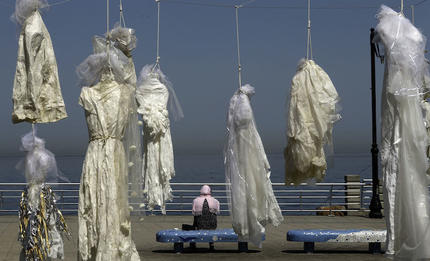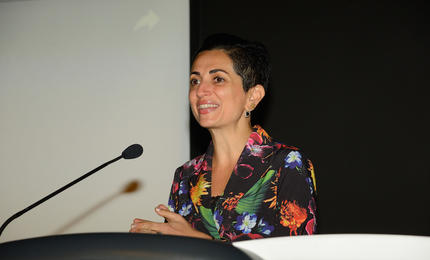A long-overdue change to Lebanese law
IWSAW’s director, Lina Abirafeh reacts to the abolition of Article 522 that offered rapists marriage to their survivors.

Lebanese NGO ABAAD launched the campaign “A White Dress Doesn’t Cover the Rape” to reignite the fight.

Activists have long waged campaigns across the country calling for the elimination of Article 522 and all other inequalities in Lebanese law.

“It is not enough to change laws. Everyone in Lebanon must act to change the way society views women.” - Lina Abirafeh, Director of the Institute for Women’s Studies in the Arab World
On 16 August, Lebanon’s government repealed the law allowing rapists to escape punishment by marrying the women they abused. Although this is a strong step by politicians in favor of women’s rights, there is still a lot more work to be done!
One in three women worldwide will experience some form of gender-based violence in her lifetime. In the Arab region, this violence exists in many forms—sexual, physical, emotional and economic. Intimate partner violence is the most common, with approximately 30 percent of women in the region affected. Child marriage is also increasing in some Arab contexts, fueled by ongoing insecurities.
Most Arab legal frameworks have limited definitions for gender-based violence. For instance, Lebanon’s 2014 law on the Protection of Women and Family Members from Domestic Violence fails to recognize marital rape as an offense, meaning that a woman surrenders her rights to her own body upon marriage. In many countries in the region, rape culture is on the rise. Perpetrators are not prosecuted and forms of violence such as sexual harassment, coercion, and marital rape are not viewed as offenses at all. The concept of “consent” is nearly absent.
And there is acceptance of these forms of violence—most stark by virtue of Article 522 of the Lebanese Penal Code, allowing rapists to escape punishment by marrying their “victim”.
Furthermore, a rapist is also not liable for the act of rape if he is already married to the victim, since marital rape remains unrecognized in Lebanon. It is unconscionable that this law persisted, allowing Lebanese women to remain without protection—and far from justice. Survivors of all forms of gender-based violence have rights to prevention, protection, and support. This egregious violation of human rights cannot continue in any form.
In February 2017, a proposal to repeal Article 522 was approved by the Parliamentary Committee for Administration and Justice. On May 15, the Lebanese Parliament was expected to vote on the issue. And on 16 August, the vote took place.
Activists have long waged campaigns across the country calling for the elimination of Article 522 and all other inequalities in Lebanese law. Lebanese NGO ABAAD launched the campaign “A White Dress Doesn’t Cover the Rape” to reignite the fight. The Institute for Women’s Studies in the Arab World has argued against Article 522 and all forms of gender-based violence.
But it is not enough to change laws. Everyone in Lebanon must act to change the way society views women. Patriarchal notions prevail, preventing women from reporting abuses. There is a dearth of statistics on the number of rape cases. And certainly a shortage of services and support. Survivors are viewed as “ruined goods” and families condone such marriages in order to preserve their honor.
There is no honor in this. In fact, rapists should receive the strictest of sentences. And in doing so, the government will send a message that it is committed to women’s rights—not just rhetoric. It will also honor international commitments and human rights treaties. On several occasions, the Committee on the Elimination of Discrimination against Women has called upon Lebanon to criminalize marital rape and abolish the rape-marriage law.
The battle for equality is not yet won, and activists in Lebanon and beyond are prepared to fight for as long as it takes. The reality in the region is one of gender inequality. So, unless we address inequalities everywhere, we will achieve equality nowhere. The latest victory is a step in the right direction.
More
Latest Stories
- On Point Celebrates Student Innovation and Commitment to Accreditation
- LAU Kicks off the Seventh Season of the Jr. NBA League
- Bridging Policy, Science and Society to Tackle Lebanon’s Environmental Challenges
- Understanding a Core Security Gap in Drone Operations
- LAU’s AKSOB Hosts a Timely Debate on Digital Banking and the Future of Finance
- LAU Study Maps Antibiotic Resistance in Lebanese Wastewater
- LAU Builds New Bridges to Lifelong Learning
- Monitoring Poverty in a Data-Deprived Environment

